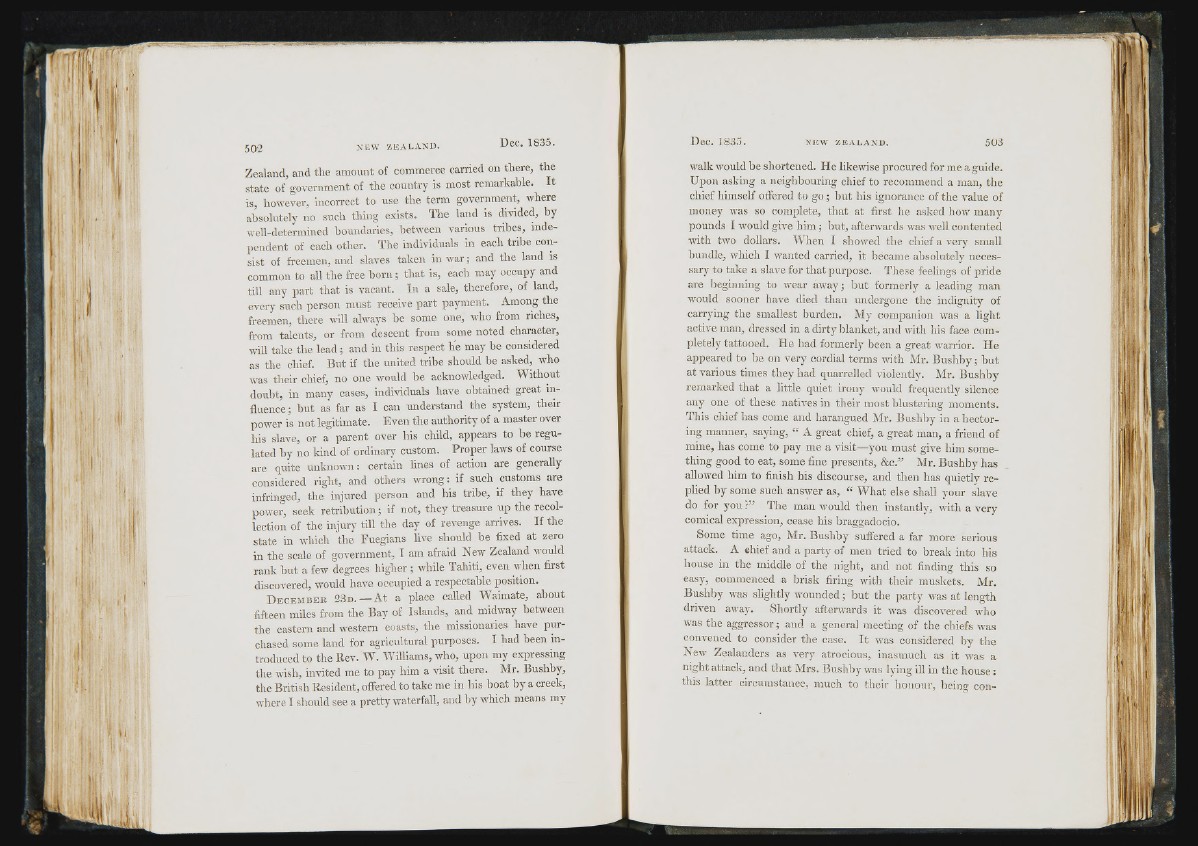
'li
]
5 0 2 NEW Z EALAND. Dec. 1835.
Zealand, and the amount of commerce carried on there, the
state of government of the country is most remarkable. It
is, however, incorrect to use the term government, where
absolutely no such thing exists. The land is divided, by
well-determined boundaries, between various tribes, independent
of each other. The individuals in each tribe consist
of freemen, and slaves taken in war; and the land is
common to all the free born; that is, each may occupy and
till any part that is vacant. In a sale, therefore, of land,
every such person must receive part payment. Among the
freemen, there will always be some one, who from riches,
from talents, or from descent from some noted character,
will take the lead; and in this respect he may be considered
as the chief. But if the united tribe should be asked, who
was their chief, no one would be acknowledged. Without
doubt, in many cases, individuals have obtained great influence
; but as far as I can understand the system, their
power is not legitimate. Even the authority of a master over
his slave, or a parent over his child, appears to be regulated
by no kind of ordinary custom. Proper laws of course
are quite unknown: certain lines of action are generally
considered right, and others wrong: if such customs are
infringed, the injured person and his tribe, if they have
power, seek retribution; if not, they treasure up the recollection
of the injury till the day of revenge arrives. If the
state in which the Fuegians live should be fixed at zero
in the scale of government, I am afraid New Zealand would
rank but a few degrees higher ; while Tahiti, even when first
discovered, would have occupied a respectable position.
D e c e m b e k 2 3 d . — At a place called Waimate, about
fifteen miles from the Bay of Islands, and midway between
the eastern and western coasts, the missionaries have purchased
some land for agricultural purposes. I had been introduced
to the Rev. W. Williams, who, upon my expressing
the wish, invited me to pay him a visit there. Mr. Bushby,
the British Resident, offered to take me in his boat by a creek,
where I should see a pretty waterfall, and by which means my
ìI M ìM
i
Dec. 1835. NEW Z EALAND. 503
walk would be shortened. He likewise procured for me a guide.
Upon asking a neighbouring chief to recommend a man, the
chief himself offered to g o ; but his ignorance of the value of
money was so complete, that at first he asked how many
pounds I would give him; but, afterwards was well contented
with two dollars. When I showed the chief a very small
bundle, which I wanted carried, it became absolutely necessary
to take a slave for that purpose. Tliese feelings of pride
are beginning to wear away; but formerly a leading man
would sooner have died than undergone the indignity of
carrying the smallest burden. My companion was a light
active man, dressed in a dirty blanket, and with his face completely
tattooed. He had formerly been a great warrior. He
appeared to be on very cordial terms with Mr. Bushby; but
at various times they had quarrelled violently. Mr. Bushby
remarked that a little quiet irony would frequently silence
any one of these natives in their most blustering moments.
This chief has come and harangued Mr. Bushby in a hectoring
manner, saying, “ A great chief, a great man, a friend of
mine, has come to pay me a visit—you must give him something
good to eat, some fine presents, &c.” Mr. Bushby has
allowed him to finish his discourse, and then has quietly replied
by some such answer as, “ What else shall your slave
do for y o u }” The man would then instantly, with a very
comical expression, cease his braggadocio.
Some time ago, Mr. Bushby suffered a far more serious
attack. A ehief and a party of men tried to break into his
house in the middle of the night, and not finding this so
easy, commenced a brisk firing with their muskets. Mr.
Bushby was slightly wounded; but the party was at length
driven away. Shortly afterwards it was discovered who
was the aggressor; and a genera] meeting of the chiefs was
convened to consider the case. It was considered by the
New Zealanders as very atrocious, inasmuch as it was a
night attack, and that Mrs. Bushby was lying ill in the house :
this latter circumstance, much to their honour, bein«- conp
'
ii